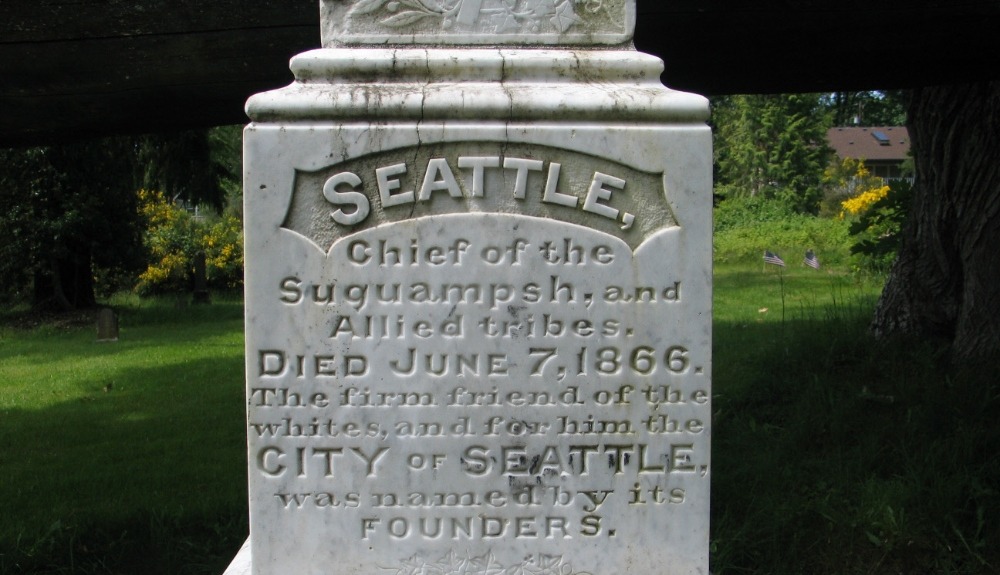There is a Pacific Northwest name that has achieved world-wide attention, deriving from the legend and alleged words of Chief Sealth.

The “Sealth phenomenon” has been discussed during meetings of the Pacific Northwest Historians Guild and at other forums. An abridged version of the old chief’s January 1855 speech to Governor Isaac I. Stevens and others at the signing of the Point Elliott Treaty has become a favorite throughout the world.
Germans have been especially captivated by Sealth’s comments, and their Green Party once adapted his words as a sort of battle cry. Several years ago, while on a Georgia sea island I spotted a tee-shirt on a busboy working my table which boasted Chief Sealth’s words across the front.
Perhaps the most popular paragraph of the Chief’s famous speech is the following: “And when the last red man shall have perished from the earth and his memory among the white man shall have perished from the earth and his memory among the white man shall have become a myth, these shores will swarm with the invisible dead of my tribe; and when your children’s children shall think themselves alone . . . they will not be alone . . . the streets of your cities and villages . . . will throng with the returning hosts . . . let (the white man) be just and deal kindly with my people, for the dead are not powerless.”
Who was Chief Sealth, whose name was pronounced See-alth or sometimes See-attle? Born of Duwamish and Suquamish parents around 1786 on Puget Sound’s Blake Island, he claimed to have seen the great sails of Captain George Vancouver’s ship in 1792. His reputation as a warrior was established after leading his Duwamish tribe in battle. Around 1810 he was elected chief of the salt-water tribes on upper Puget Sound. His abilities as an orator and leader rivaled his military skills.
Hard-drinking “Doc” Maynard became Chief Sealth’s friend. Teetotaler David Denny also liked Sealth, describing his “(full) chest (which) gave him considerable lung power.”
When Euro-American settlers met Sealth his shoulder-length hair was gray and he wore a breechclout and faded blue blanket. Taller than most Duwamish or Suquamish tribesmen, he was judged “friendly” by the whites. Because of his close relationship with Maynard, and because he was the first local chief to sign the still-controversial Point Elliott Treaty, Native opinion about Sealth is mixed. My Post Alley colleague, David Buerge, has written a full biography of Chief Seattle.
Arthur Denny and his friends chose Sealth (Seattle) as the name for the new town on Elliott Bay. Some reports claim that the superstitious old chief, despite his alleged conversion to Roman Catholicism, objected to that choice.
Chief Sealth died at the Port Madison Reservation on June 7, 1866, and was buried in a nearby Suquamish hillside graveyard following both Salish and Catholic ceremonies. No local newspaper took note of the old chief’s passing, but his monument is large, ornate, and visited frequently.
Discover more from Post Alley
Subscribe to get the latest posts sent to your email.

David Buerge’s book, along with Murray Morgan’s “Skid Road” are the two books that every Seattle newcomer should read. Thanks for your article, Junius, and for your reminder of where to learn more about our city’s namesake.
You are right, Jean! I know I am going to enjoy any article written by Junius. He ranks right up and next to great Pacific Nothwest Historians in my estimation.
I would not bet too much money on the authenticity of Chief Seattle’s “speech”…
https://en.wikipedia.org/wiki/Chief_Seattle%27s_speech
I recommend Native Seattle: Histories from the Crossing-Over Place by Coll Thrush. It has histories of place names and context of Natives and settlers here when the Denny party arrived.